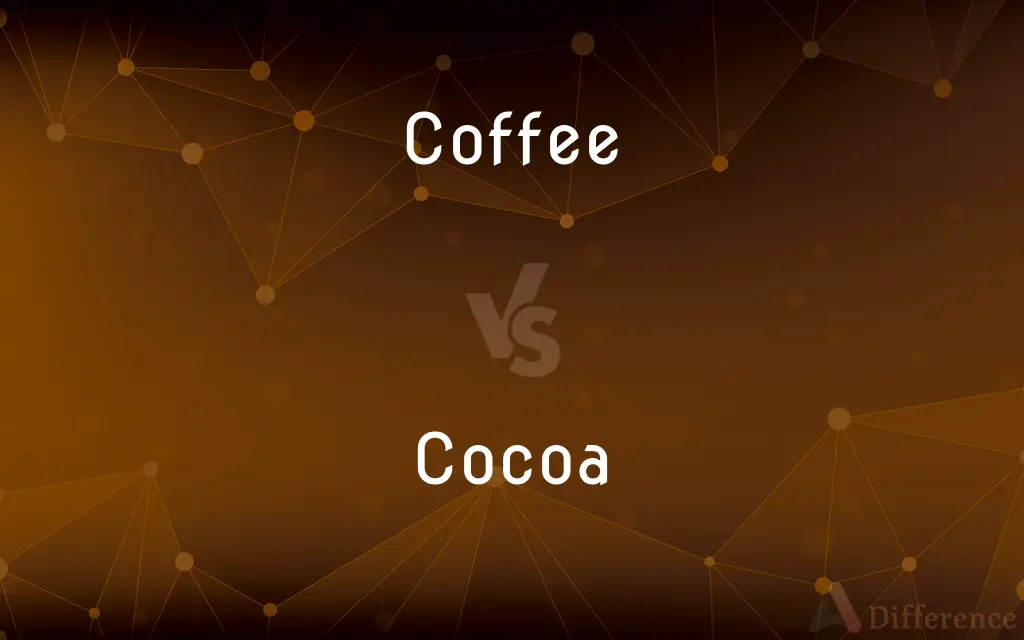Coffee vs. Cocoa — What's the Difference?
By Tayyaba Rehman & Urooj Arif — Updated on April 18, 2024
Coffee is a brewed drink from roasted beans, noted for its stimulating effect due to caffeine, whereas cocoa is made from roasted cacao beans, known for its rich flavor and antioxidant properties.

Difference Between Coffee and Cocoa
Table of Contents
ADVERTISEMENT
Key Differences
Coffee, primarily derived from Coffea plant beans, is celebrated for its robust, often bitter flavor which can vary greatly depending on its origin and roast. On the other hand, cocoa comes from the seeds of the Theobroma cacao tree and is primarily used in the production of chocolate, offering a rich, slightly bitter and earthy flavor.
Coffee is typically consumed in its brewed form and is renowned for its stimulating effects attributed to caffeine. Whereas cocoa is often consumed as hot chocolate or used as a primary ingredient in chocolate bars and sweets, providing not only flavor but also significant amounts of antioxidants and minimal caffeine.
The preparation of coffee involves roasting coffee beans and brewing them with hot water, creating a variety of beverages like espresso, latte, and cappuccino. On the other hand, cocoa powder is made by fermenting, drying, and roasting cacao beans, then removing the fat or cocoa butter.
Coffee culture has evolved into a diverse and sophisticated culinary practice globally, influencing social practices and café culture. Whereas cocoa consumption is deeply intertwined with confectionery and dessert industries, playing a significant role in holiday traditions and comfort food scenarios.
Health-wise, coffee consumption has been linked to increased alertness and potential health benefits like reduced risk of certain diseases, depending on intake levels. Cocoa, however, is praised for its high antioxidant content, which may offer cardiovascular and cognitive benefits.
ADVERTISEMENT
Comparison Chart
Primary Source
Coffea plant beans
Theobroma cacao seeds
Typical Use
Brewed beverages
Hot drinks, desserts, chocolate
Flavor Profile
Robust, varying from bitter to acidic
Rich, earthy, slightly bitter
Main Effects
Stimulating (caffeine)
Mildly stimulating, antioxidants
Cultural Significance
Extensive café culture, daily ritual
Integral to confectionery, holiday traditions
Compare with Definitions
Coffee
A plant (Coffea) that produces beans from which coffee is brewed.
The coffee plant requires a specific climate to thrive.
Cocoa
A hot drink made from cocoa powder and milk or water.
Nothing beats having hot cocoa on a cold winter day.
Coffee
The color resembling that of brewed coffee.
She painted the living room in a warm coffee tone.
Cocoa
The seed of the cacao tree and the basis of chocolate.
High-quality cocoa is essential for good chocolate.
Coffee
A serving of coffee in a cup or mug.
Would you like another coffee?
Cocoa
A powder made from roasted and ground cacao seeds, often used to make chocolate.
She added cocoa to the cake recipe for a chocolate flavor.
Coffee
A hot beverage made by steeping ground roasted coffee beans in water.
I like to start my morning with a fresh cup of coffee.
Cocoa
Pertaining to the color similar to that of cocoa powder.
The curtains were a rich shade of cocoa.
Coffee
Coffee beans as a commodity.
Coffee prices fluctuate based on global demand and harvest yields.
Cocoa
Relating to cocoa-based products.
The cocoa industry is vital to the economies of some tropical countries.
Coffee
Coffee is a brewed drink prepared from roasted coffee beans, the seeds of berries from certain Coffea species. All fruit must be further processed from a raw material—the fruit and seed—into a stable, raw product; un-roasted, green coffee.
Cocoa
A powder made from cacao seeds after they have been fermented, roasted, shelled, ground, and freed of most of their fat.
Coffee
A hot drink made from the roasted and ground seeds (coffee beans) of a tropical shrub
A coffee pot
A cup of coffee
Cocoa
See hot chocolate.
Coffee
The shrub which yields coffee seeds, native to the Old World tropics.
Cocoa
A moderate brown to reddish brown.
Coffee
Any of various tropical African shrubs or trees of the genus Coffea, especially C. arabica or C. canephora, widely cultivated in the tropics for their seeds that are dried, roasted, and ground to prepare a stimulating aromatic drink.
Cocoa
The dried and partially fermented fatty seeds of the cacao tree from which chocolate is made.
Coffee
The beanlike seeds of this plant, two of which are found in each fruit.
Cocoa
An unsweetened brown powder made from roasted, ground cocoa beans, used in making chocolate, and in cooking.
Coffee
The beverage prepared from the seeds of this plant
Likes to drink coffee with breakfast.
Cocoa
(uncountable) A hot drink made with milk, cocoa powder, and sugar.
Do you like cocoa?
Coffee
A serving of such a beverage
Ordered two coffees with sugar.
Cocoa
(countable) A serving of this drink.
I like to watch TV with a cocoa.
Coffee
A moderate brown to dark brown or dark grayish brown.
Cocoa
A light to medium brown colour.
Coffee
An informal social gathering at which coffee and other refreshments are served.
Cocoa
Alternative spelling of coco.
Coffee
(uncountable) A beverage made by infusing the beans of the coffee plant in hot water.
Cocoa
Of a light to medium brown colour, like that of cocoa powder.
Coffee
(countable) A serving of this beverage.
Cocoa
A tall palm tree producing the cocoanut (Cocos nucifera) as its fruit. It grows in nearly all tropical countries, attaining a height of sixty or eighty feet. The trunk is without branches, and has a tuft of leaves at the top, each being fifteen or twenty feet in length, and at the base of these the nuts hang in clusters; the cocoanut tree. It is widely planted throughout the tropics, and in some locations as an ornamental tree.
Coffee
The seeds of the plant used to make coffee, called ‘beans’ due to their shape.
Cocoa
A preparation made from the seeds of the chocolate tree, and used in making, a beverage; also the beverage made from cocoa or cocoa shells.
Coffee
The powder made by roasting and grinding the seeds.
Cocoa
A beverage made from cocoa powder and milk and sugar; usually drunk hot
Coffee
A tropical plant of the genus Coffea.
Cocoa
Powder of ground roasted cocao beans with most of the fat removed
Coffee
A pale brown colour, like that of milk coffee.
Coffee
The end of a meal, when coffee is served.
He did not stay for coffee.
Coffee
Of a pale brown colour, like that of milk coffee.
Coffee
Of a table: a small, low table suitable for people in lounge seating to put coffee cups on.
Coffee
(intransitive) To drink coffee.
Coffee
(transitive) To give coffee.
Coffee
The "beans" or "berries" (pyrenes) obtained from the drupes of a small evergreen tree of the genus Coffea, growing in Abyssinia, Arabia, Persia, and other warm regions of Asia and Africa, and also in tropical America.
Coffee
The coffee tree.
Coffee
The beverage made by decoction of the roasted and ground berry of the coffee tree.
They have in Turkey a drink called coffee. . . . This drink comforteth the brain and heart, and helpeth digestion.
Coffee
A cup of coffee{3}, especially one served in a restaurant; as, we each had two donuts and a coffee; three coffees to go.
Coffee
A social gathering at which coffee is served, with optional other foods or refreshments.
Coffee
A color ranging from medium brown to dark brown.
Coffee
A beverage consisting of an infusion of ground coffee beans;
He ordered a cup of coffee
Coffee
Any of several small trees and shrubs native to the tropical Old World yielding coffee beans
Coffee
A seed of the coffee tree; ground to make coffee
Coffee
A medium to dark brown color
Common Curiosities
What is the primary difference between coffee and cocoa?
Coffee is made from roasted coffee beans and is mainly consumed as a beverage, known for its caffeine content. Cocoa is made from cacao beans, used in chocolates and as a hot drink, noted for its antioxidants.
Are coffee and cocoa grown in similar conditions?
Both coffee and cocoa plants thrive in tropical climates, but they have specific altitude and temperature preferences for optimal growth.
What are the health benefits of coffee and cocoa?
Coffee can enhance alertness and has been linked to a lower risk of several diseases. Cocoa is highly regarded for its antioxidants, which can benefit heart and brain health.
How are coffee and cocoa processed differently?
Coffee beans are roasted and brewed, while cocoa beans undergo fermentation, drying, and roasting before being processed into powder or chocolate.
Is it better to drink coffee or cocoa for health?
Both offer health benefits, but cocoa might be preferable for those sensitive to caffeine or looking for high antioxidant intake.
Do coffee and cocoa have any environmental impacts?
Yes, both crops can have significant environmental impacts, including deforestation and soil degradation, if not managed sustainably.
Which has more caffeine, coffee or cocoa?
Coffee generally contains significantly more caffeine than cocoa.
Can coffee or cocoa be used in cooking?
Yes, both are used in cooking; coffee can flavor cakes and sauces, while cocoa is a staple in baking and desserts.
How has the cultural significance of coffee differed from cocoa?
Coffee has a prominent café culture and is often associated with daily rituals, while cocoa is more connected with confectionery and festive occasions.
Can coffee and cocoa be mixed together?
Yes, mixing coffee and cocoa is common in beverages like mochas, blending the stimulating effect of coffee with the rich taste of cocoa.
Can people allergic to coffee drink cocoa?
Yes, people with coffee allergies can typically consume cocoa unless they have allergies to components specific to cocoa.
What is the best way to store coffee and cocoa?
Coffee is best stored in an airtight container at room temperature, while cocoa powder should be kept in a cool, dry place.
What are some popular coffee and cocoa blends?
Beverages like café mocha mix coffee with cocoa to create a rich, flavorful drink.
Which is more expensive to produce, coffee or cocoa?
The cost varies based on the region and production practices, but generally, both have significant costs associated with their cultivation and processing.
What are the future trends for coffee and cocoa consumption?
Trends suggest a growing emphasis on sustainable and ethical sourcing for both coffee and cocoa, alongside innovative uses in gourmet and health-focused products.
Share Your Discovery

Previous Comparison
Transparency vs. Opacity
Next Comparison
Whiskey vs. GinAuthor Spotlight
Written by
Tayyaba RehmanTayyaba Rehman is a distinguished writer, currently serving as a primary contributor to askdifference.com. As a researcher in semantics and etymology, Tayyaba's passion for the complexity of languages and their distinctions has found a perfect home on the platform. Tayyaba delves into the intricacies of language, distinguishing between commonly confused words and phrases, thereby providing clarity for readers worldwide.
Co-written by
Urooj ArifUrooj is a skilled content writer at Ask Difference, known for her exceptional ability to simplify complex topics into engaging and informative content. With a passion for research and a flair for clear, concise writing, she consistently delivers articles that resonate with our diverse audience.
















































